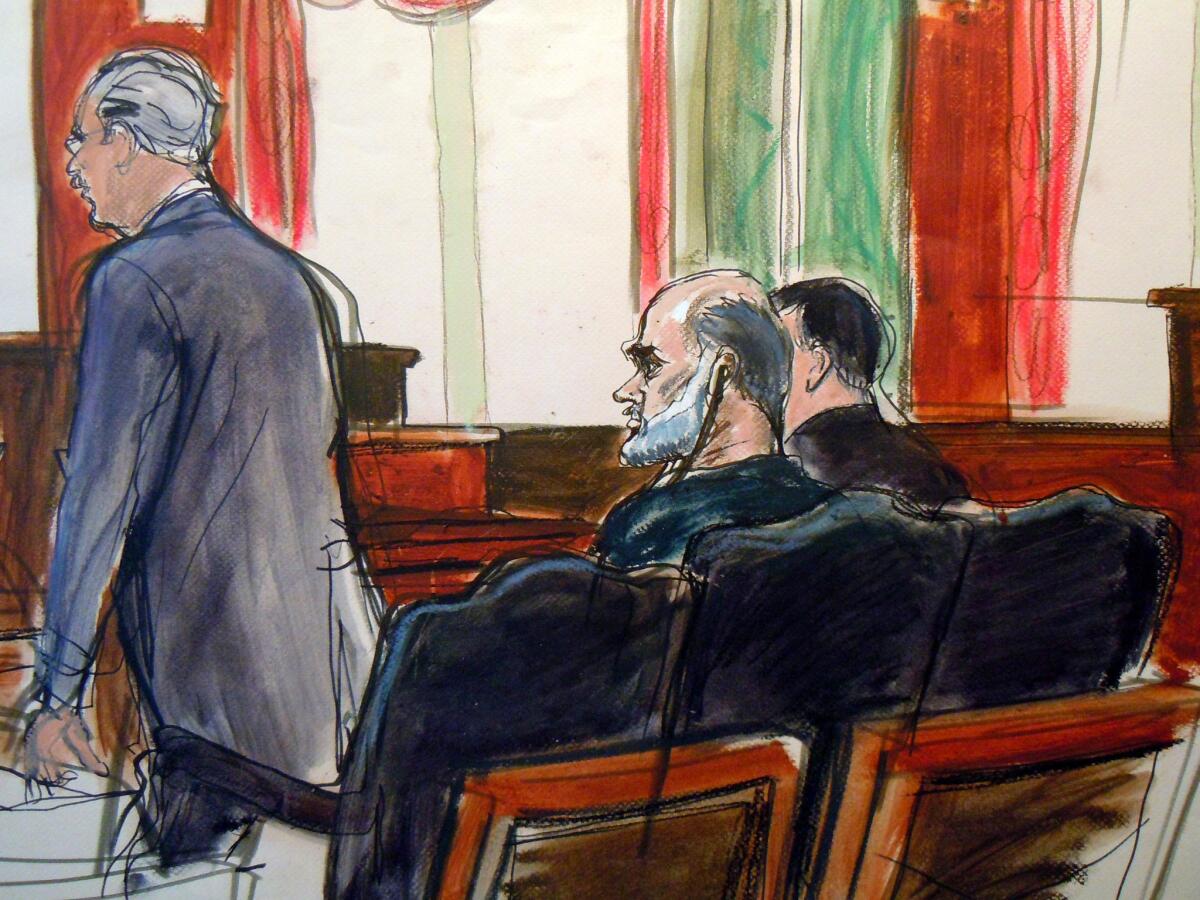Bin Laden son-in-law pleads not guilty to new terrorism charges

- Share via
NEW YORK -- The son-in-law of Osama bin Laden entered not guilty pleas Monday to two additional terrorism charges filed against him last week, and a judge granted the prosecution’s request that jurors chosen for the trial remain anonymous, even while they go through the selection process.
The trial of Sulaiman Abu Ghaith is due to begin Feb. 3 and would mark the first time a terrorism suspect charged with crimes related to the Sept. 11, 2001, attacks has been tried in a U.S. civilian court.
The case has pitted the Obama administration, which wants to close the U.S. prison at the naval station at Guantanamo Bay, Cuba, against those who say high-profile terrorism suspects should be treated as enemy combatants and kept at Guantanamo.
Abu Ghaith, who in court goes by the name Mr. Sulaiman, appeared in federal court in Lower Manhattan clad in a baggy gray prison top and trousers with a bright orange T-shirt underneath. His white beard reached beyond the tip of his chin, and he chatted with his defense team and smiled as he walked into court.
An indictment unsealed last March alleged that Abu Ghaith “served alongside” the Al Qaeda leader from May 2001 through part of 2002 and appeared on videos praising the Sept. 11 attacks and threatening more assaults.
A superseding indictment unsealed last Friday added two more counts accusing Abu Ghaith of conspiring to provide material support and resources to terrorists and providing support to terrorists.
New details in the latest indictment include allegations that Abu Ghaith, in his role as Bin Laden’s spokesman and an Al Qaeda propaganda chief, delivered a speech in April 2002 praising the bombing that month of a synagogue in Tunisia.
In that speech, prosecutors allege, Abu Ghaith alluded to the “victory” of the 2001 attacks in New York in Washington and said that “the organization … is now observing, investigating and monitoring new American targets … which we will strike at a period that is not long.”
“We shall be launching terrorist attacks on America … at a time, place and a method of our choosing,” the indictment accuses Abu Ghaith of saying in the April address.
Abu Ghaith, 48, is a Kuwaiti who was arrested by U.S. officials early this year in Jordan while he was traveling from Turkey back to his home country. In their motion to have jurors’ names, addresses and other identifying information kept secret, even from attorneys, prosecutors said the case was certain to include evidence of “chilling and extensive threats against the United States by the defendant.”
“Reasonable jurors could of course fear for their safety,” Assistant U.S. Atty. Michael Ferrara said in a court document. “Fear is at odds with impartiality.”
Defense attorney Geoffrey Stewart argued that adding an extra layer of security to jurors could hurt the attorneys during the selection process. “To know a neighborhood and a last name of a person tells us a lot,” he said.
Stewart also said the extra security, which will involve jurors being guarded by U.S. marshals and dropped at undisclosed locations each day after court, will add to their fears. “All those factors together will send a message to the jury that there’s something to be feared here,” Stewart said.
U.S. District Judge Lewis A. Kaplan said he agreed with the prosecution. Kaplan did not rule on a motion by the defense to grant a 60-day delay in the start of the trial. Defense attorney Stanley Cohen said he needed the delay because of new details in the latest indictment, which he said change the prosecution’s theory of Abu Ghaith’s alleged role in the 2001 attacks.
Kaplan is expected to rule on the motion for a delay at the next court appearance Jan. 7.
Abu Ghaith could face life in prison if convicted on any of the charges.
ALSO:
Quiz: Test your knowledge of 2013’s national news
Man throws 3-year-old son, self off Manhattan rooftop
Federal judge allows same-sex weddings in Utah to continue
More to Read
Sign up for Essential California
The most important California stories and recommendations in your inbox every morning.
You may occasionally receive promotional content from the Los Angeles Times.











